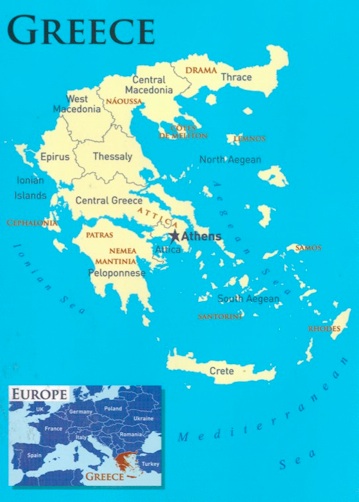Ancient Grapes, Modern Wines


Ancient Grapes, Modern Wines


Anyone who has traveled to Greece, or simply seen travel posters, can easily picture images of sun-drenched white washed houses, azure skies, and cobalt seas.
But the wines, some people think, wrinkling their noses, are another matter. For many, their only experience with Greek wine has been with Retsina, a peculiar pine resin-scented beverage. Once considered Greece’s national drink and a curiosity for tourists, this odd tasting wine leaves most with little interest in sampling Greek wines ever again.
“Right now,” Pavlidis explained, “Greece offers the perfect combination of modern technology matched with ancient varieties, making it unique in the wine world.”
“That is unfortunate, because there is no more exciting place in the wine world today than Greece,” says Michael Pavlidis, a Greek native who now lives in Grass Valley. Pavlidis knows. He is the West Coast Sales Manager for Athenee Imports, the largest, oldest, and best importer of quality Greek wines to the United States.
“Right now,” Pavlidis explained, “Greece offers the perfect combination of modern technology matched with ancient varieties, making it unique in the wine world.”
There’s no question Greece has a very long wine history, dating back to between 2000 and 3000 BC. While other early civilizations celebrated wine, the ancient Greeks really took it seriously allocating one of their 12 gods, Dionysus (later Italianized as Bacchus) to supervise the cultivation of vineyards and the merriment of drinking.

The Greek historian Thucydides wrote in the 5th century BC “The peoples of the Mediterranean began to emerge from barbarism when they learned to cultivate the olive and the vine.”
As early as the 4th century BC, Greek innovations included the study of vineyard soils and their proper match to specific grapevines, the minimization of yields for more intense concentration of flavors and quality, and the practice of using plant cuttings for new vineyard plantings. The Greeks also developed the system of vine training for easier cultivation and harvesting, rather than letting the grapevines grow untrained in bushes or up trees.
The Greeks also recognized the influence of climate and were the first to create their own Appellations of Origin. Their system of different Appellations of Origin was taken very seriously and strong penalties were imposed on violators in order to ensure the authenticity of their wines.
Other Greek innovations included harvesting deliberately unripe grapes to produce a more acidic wine for blending and boiling grape must as a way of adding sweetness to a wine.
Hippocrates studied wine’s medicinal uses to cure fevers, ease convalescence, and as an antiseptic. Greek doctors prescribed wine as an analgesic, diuretic, tonic and digestive aid.
Michael Pavlidis explained that what really ties ancient Greece to the modern world is that we can actually drink some of the same varieties today. The philosopher, Aristotle, mentions “Limnia Ampelos” meaning the vine from the Greek island Limnos. That is the same as the modern Greek varietal, Limnio, making it the oldest known wine grape still in cultivation.
Other Greek grape varieties such as Athiri, Aïdani, and Dafani, are all surviving examples of ancient Greece.
Wine is so much about “place” that the possibility of drinking the same wine that Aristotle would have enjoyed more than 2000 years ago is simply too cool an opportunity to resist.
With the rise of the Roman Empire, the wine spotlight switched from Greece to Italy. It was a long, downhill slide from there. Greece continued to produce and trade in wine but it was often controlled by outside forces and there were multi-century rough patches along the way. Greek independence in 1821 left a united but impoverished country and the first half 20th century was no better, marred by wars, including a nasty civil war.
For most of the 20th century, the Greek wine industry produced inexpensive table wines. Finally, as tourists started discovering the beauty of Greece and Aegean Sea in the 1960s, inferior bulk wines and Retsina were what they were offered to drink.
“That has changed,” Pavlidis explained. “Recently the Greek wine industry has undergone enormous improvement with serious investments in modern wine making technology. A new generation of native winemakers is being trained in the best wine schools around the world. Their efforts are paying off as Greek wines are starting to receive the highest awards in international competitions.”
Amy Olsen, a Grass Valley based special events co-ordinator and marketing specialist, has been working with Pavlidis to promote Greek wines. “Kefi is a word the Greeks use that translates to joy of life,” Olsen explained. “Part of the excitement is experiencing Greek culture through the wines.”
Championing Greek wines will be challenging. There are countless indigenous varieties with unfamiliar names like Agiorghitiko or Roditis, with few consumers who know if they are even red or white, much less what flavors to expect.
That’s also what makes Greece so exciting. For any wine drinker with an inquiring palate, this is wide-open territory to explore with adventure lurking in every bottle.
“The wines have similarities that we are used to, still they are unique,” Olsen said. “There are different enough to be interesting yet familiar enough to be approachable.”
Pavlidis summed it up, saying “Greek people are very proud of their history, about philosophy, democracy, theatre and arts, so keeping indigenous varieties alive is just part of the kefi, the vibrancy of our Greek culture.”
Greece, Ancient Grapes Make Modern Wines
November 7, 2012

